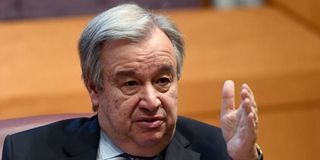UN releases Sh2.7 billion to fight GBV across the globe

United Nations Secretary-General Antonio Guterres (pictured) in April said there had been a “horrifying global surge in domestic violence” as a direct result of lockdowns due to the Covid-19 pandemic.
What you need to know:
- The United Nations (UN) has released $25 million (Ksh2.7 billion) from the UN’s Emergency Fund to support women-led organizations.
- At least 30 per cent of the money to be given to women-led organizations that prevent violence against women and girls, and help victims and survivors access medical care, family planning, legal advice, safe spaces, mental health services and counselling.
The United Nations (UN) has released $25 million (Ksh2.7 billion) from the UN’s Emergency Fund to support women-led organizations that prevent and respond to gender-based violence in humanitarian settings.
UN Humanitarian Chief Mark Lowcock said the funding had already been sent to the United Nations Population Fund (UNFPA) and UN Women.
The two organizations have been asked to channel at least 30 per cent of the money to women-led organizations that prevent violence against women and girls, and help victims and survivors access medical care, family planning, legal advice, safe spaces, mental health services and counselling.
Mr Lowcock in a statement, said Covid-19 pandemic has revealed the full extent of gender inequality while creating a set of circumstances that threaten to reverse the limited progress that has been made.
Gender equality
“Everyone who is serious about gender equality and women’s rights must speak up. Then those with the means to do so need to put their money where their mouth is. The needs of women and girls in humanitarian settings continues to be overlooked and underfunded.
The announcement came as the world marked 16 Days of Activism Against Gender-based Violence, an international campaign to challenge violence against women and girls, which runs each year from November 25 to December 10.
Dr Natalia Kanem, Executive Director of the United Nations Population Fund said it is time to say ‘Enough’ to gender-based violence and to prioritize the rights and needs of women and girls in humanitarian crises.
Emergency fund
“This grant will bring transformative change to women and girls, including the women-led organizations we work with on the ground,’ said Kanem.
UNFPA will receive $17 million (Ksh18B) and $8 million (Ksh892 million) will go to UN Women. The two organisations will then decide where and how the money will be spent.
The funding comes from the United Nations’ Central Emergency Response Fund (CERF), an emergency fund that offers one of the fastest and most effective ways to help people affected by crises.
Since it was established in 2005, the fund has provided close to $7 billion for life-saving humanitarian action that has helped hundreds of millions of people across more than 100 countries and territories.
The funding by the UN comes at a time when GBV cases have increased tremendously across the world in the wake of Covid-19 pandemic.
Since the outbreak of the coronavirus, emerging data shows of an increase in violence against women and women across the world.
Domestic violence
According to UN Women, reports from those on the frontlines have shown that all types of violence against women and girls, particularly domestic violence, has intensified.
In April 2020, UN Secretary-General, António Guterres noted that there had been a “horrifying global surge in domestic violence” as a direct result of lockdowns due to the Covid-19 pandemic.
The UN chief urged governments to make the prevention and redress of violence against women a key part of their national response plans for Covid-19, and outlined actions that can be taken to improve the situation.




